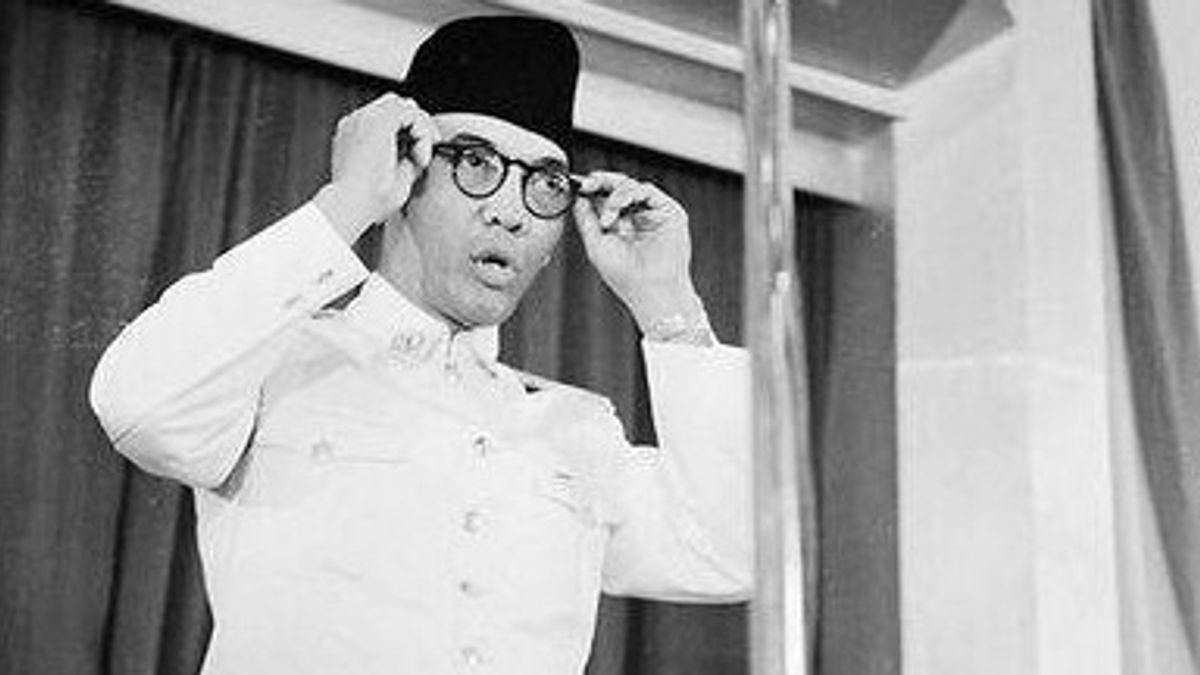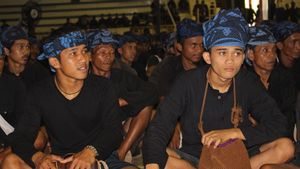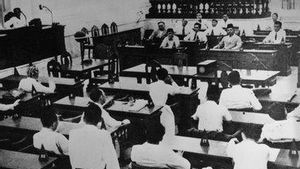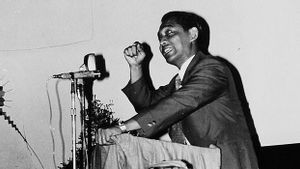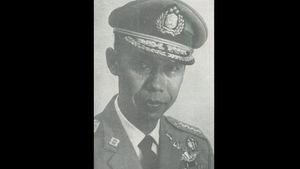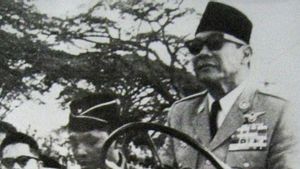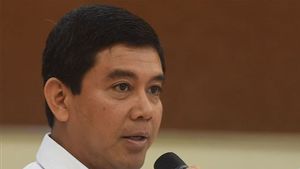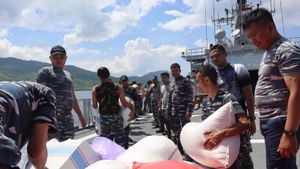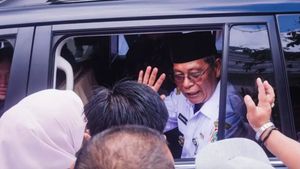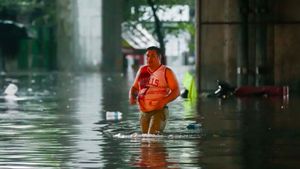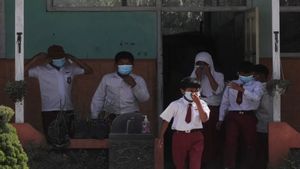Coordinating Minister for the Economy Airlangga Hartarto stated that he was preparing a fleet owned by Pelni to help suppress the spread of COVID-19. This effort was made because the number of virus transmission from Wuhan was high. In the plan, Airlangga has collaborated with the Ministry of Transportation, the National Disaster Management Agency (BNPB), and the Ministry of Health.
"The government provides the Isoter ship, which is a centralized isolation ship that uses the Pelni fleet," he said virtually, Monday, August 23.
The six fleets of ships prepared by Pelni will be adjusted to the specifications for the needs of COVID-19 patients. The six ships will be able to accommodate a total of thousands of COVID-19 patients.
As for the details, Pelni in Medan will operate KM Bukit Raya with a capacity of 463 beds, Lampung with KM Lawit with 437 beds, Makassar KM Umsini with 849 beds. Then, in Bitung with a 458-bed fleet, Sorong with 460-bed KM Sirimau. Finally, in Jayapura with KM Tidar with a capacity of 929 beds.
"The number of available beds is 3,596 beds with six ships spread across the archipelago," he said.

The pinnacle of being loved by scholars arrived. The President Director of PT Pelni, Insan Purwarisya L. Tobing, has previously disclosed Pelni's readiness to assist the government. Pelni is even preparing a fleet of ships to be ready to be used as a place of isolation.
"Before use, all ships will be sterilized and equipped with supporting facilities for the implementation of floating isolation by the local government and agencies. This must be done in order to meet the standards as an independent isolation location as determined by the Ministry of Health as has been done at KM Umsini in Makassar "Insan explained, quoted on the official Pelni website.
The six ships are planned to be filled with complete facilities. All ships will be provided with surveillance cameras, internet, polyclinics, jogging areas, and top decks that can be used for sunbathing and sports. As a result, each patient can make a speedy recovery with Pelni. People also realize that it is the duty of Pelni to put the national interest first. This includes the COVID-19 pandemic.
"Through this collaboration, we believe that each party will maximize their potential and work hand in hand to handle the Covid-19 case in Indonesia so that it can get better soon," said Insan.
Soekarno's Trikora Echo
Efforts to involve Pelni to help the government are not new. Since the first, the positive contribution of Pelni has been written in the history of the nation. Including, when Pelni was involved in the Tri Komando Rakyat (Trikora) operation. This operation began because the first President of the Republic of Indonesia, Soekarno, made the issue of seizing West Irian (Papua) from the Netherlands a crucial matter. Bung Karno said that without West Irian, the archipelago would not fully become Indonesia.
“Compared to our archipelago, West Irian is only as wide as a Moringa leaf, but West Irian is a part of our body. Would someone allow one of his limbs to be amputated without putting up a fight?” Bung Karno's words were written by Cindy Adams in the book Bung Karno: Penyambung Lidah Rakyat Indonesia (1965).
The West Irian problem is slowly becoming a personal problem. Bung Karno 'insisted' to carry out various negotiations to seize West Irian. However, because Indonesia was too dependent on diplomacy and using tongues, the Dutch acted fraudulently. As a result, Indonesia is often harassed at the United Nations (UN) forum. The proposal for West Irian to become part of Indonesia was rejected.

Bung Karno was angry and began to lose his temper. The path of diplomacy did not work, the path of war was chosen by Bung Karno. The narrative of Tri Komando Rakyat (Trikora) became Bung Besar's ultimate effort in Yogyakarta on December 19, 1961. The number one man in Indonesia mandated efforts to thwart the formation of a puppet state of Papua made in the Netherlands, to raise the Red and White in West Irian, and to maintain the integrity of the country.
Trikora's spirit then boomed everywhere. Including in front of the people of Celebes in 1962. Bung Karno promised to raise the Red and White in the land of Papua soon.
"God willing, soon and within this year the Red and White will be flying in West Irian. We will not care whether the invasion of West Irian caused the world to be shocked or not. We don't care, we don't care, because the return of Irian The West into the territory of the Republic of Indonesia is a firm determination of the Indonesian people and a bloodbath that does not depend on the Indonesian people," said Bung Karno's speech quoted by Rosihan Anwar in the book Sukarno, Tentara, PKI: Segitiga Kekuasaan Sebelum Prahara Politik, 1961-1965 (2006)
Pelni's central role in Trikora
It was during the Trikora operation that the Pelni fleet was deployed by Deputy II Commander of the Navy (1959-1963) who later became Minister of Sea Transportation and Coordinating Minister for Maritime Affairs (1964-1960), Ali Sadikin. The man who was nicknamed Kennedy from the East said the involvement of the Pelni fleet was part of Pelni's function as a revolutionary tool. A tool used for the benefit of government and social justice.
“Brothers and sisters, we all see ourselves as Instruments of the Revolution, both as individuals and as state organizations. The objective situation requires that even the Revolution requires us to be truly its instrument – that is, the instrument of the revolution. We, as tools of the revolution, in accordance with the laws of the revolution, must know who is the enemy and who is the friend, a clear dividing line must be drawn and the right attitude must be taken towards friends and against enemies," said Ali Sadikin, who later became widely known as the Governor of DKI Jakarta (1966-1977).
Ali, who graduated from the Navy, knows exactly what to do when a country is in a state of war. So all the people, including Pelni immediately take part in maintaining Indonesia's sovereignty. At the same time seizing West Irian from the hands of the Dutch.
Some of them are named KM Abulombo, KM Ketapang, KM Sapudi, KM Tolando, KM Tampomas, KM Gunung Jati, and KM Bengawan. Each of the Pelni fleets has the task of supplying food and war equipment. Moreover, Pelni's KM Tampomas was used as a floating hospital ship. Also, KM Gunung Jati was given the role of transporting two battalions of Red Berets commanded by Major Dompas to West Irian.

“I am a sailor, so I know how weak our maritime power is. I experienced the struggle for West Irian. All commercial ships from Pelni, Djakarta Lloyd, and the private sector were mobilized to carry 30 thousand troops. It interferes with the interests of the people. Now, this is my interest in the maritime, on your behalf, isn't it?” said Ali Sadikin as written by Ramadhan KH in the book Press Asking, Bang Ali Answering (1995).
Trikora echoed by Soekarno also paid off. West Irian succeeded in uniting with Indonesia in May 1963. In negotiations between Indonesia and the Netherlands brokered by the United States, the Netherlands agreed to budget 30 million dollars per year for the development of West Irian through the United Nations.
Meanwhile, Indonesia was obliged to hold a Popular Opinion (Pepera) for the people of West Irian in December 1969. The Act then took place from 14 July 1969 in Merauke and ended on 4 August 1969 in Jayapura. As a result, West Irian completely became part of Indonesia.
In this way, Pelni's role in Trikora completes the narrative of the Indonesian territory that stretches from Sabang to Merauke. The form of Pelni's concern for the country continues. Moreover, Pelni often mobilizes its fleet of ships to help when a disaster strikes Indonesia. Including, the Aceh Tsunami disaster in 2004. As long as Indonesia is maintained, losses are the umpteenth number of problems for Pelni.
“With the transformation of the company into a state company in January 1961, the company's profits were not the main thing. National pride and social justice were more important in the recognition of the socialist government at that time. The existence of Pelni at that time was not expected to benefit from the lines opened to several countries, such as India and Arabia, but to transport important commodities at rates below the commercial level," concluded HW Dick in the book Industri Pelayaran Indonesia: Kompetisi dan Regulasi (1989).
*Read other information about NUSANTARA HISTORY or read other interesting articles from Detha Arya Tifada.
Other MEMORY
SEE ALSO:
The English, Chinese, Japanese, Arabic, and French versions are automatically generated by the AI. So there may still be inaccuracies in translating, please always see Indonesian as our main language. (system supported by DigitalSiber.id)
